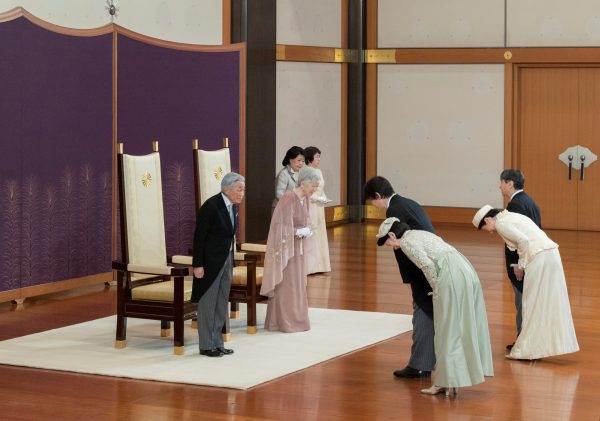Akihito reinvented Japan’s monarchy by carving out new roles such as consoler-in-chief and as Japan’s chief emissary for regional reconciliation. Healing the festering wounds of Japan’s wartime rampage in Asia from 1931–45 was the unfinished business of his father’s reign. Akihito visited nations victimised by Japanese aggression and offered remarks of remorse, prayers for the fallen and gestures of contrition. In doing so, he has contributed more than all of Japan’s prime ministers combined in advancing reconciliation. These efforts have helped Japan regain a dignity that still remains imperilled by revisionists.
Japanese emperors are barred from a political role but Akihito has influenced the politics of the past by distancing himself from Prime Minister Abe Shinzo and his core conservative constituents who embrace a valorising narrative that justifies Japanese aggression in the name of Pan-Asian liberation.
When Akihito began his reign in 1989, there was a mainstream consensus that Japan should emulate Germany on war responsibility. But since then, Japan’s political centre of gravity has lurched rightward. Reconciliation efforts now draw criticism as ‘apology diplomacy’ and ‘masochistic history’. Akihito has thus found himself an inadvertent dissident and symbol of reproach to the nation’s conservative elite.
Akihito most famously repudiated Japan’s revisionists, in the subtle manner he must, when he offered a riposte to Abe’s 2015 speech marking the 70th anniversary of Japan’s surrender. Abe’s efforts to attribute Japan’s current peace and prosperity to the wartime deaths of 3 million Japanese was brushed aside by Akihito. He asserted that ‘70 years have passed since the end of the war and our country today enjoys peace and prosperity thanks to the ceaseless efforts made by the people of Japan towards recovery from the devastation of the war and towards development, always backed by their earnest desire for the continuation of peace’.
Conservatives are also unhappy that Akihito maintained the boycott on visits to Yasukuni Shrine that his father began in 1978 after learning that the souls of 14 Class-A war criminals were enshrined there. Japanese liberals have criticised the enshrinement of these key figures among the wartime elite as they were responsible for instigating a war of aggression that devastated the nation and the region.
In June 2018, Yasukuni’s head priest harshly condemned the imperial boycott, asserting that ‘the Emperor is trying to crush Yasukuni Shrine’. He also claimed that Crown Prince Naruhito will probably continue the boycott and made an unsubstantiated allegation that Crown Princess Masako ‘abhors Shinto and shrines’. He resigned soon after.
As Japan transitions into the Reiwa (beautiful harmony) era, Naruhito has made clear that he shares his father’s views about Japan’s wartime responsibility and his commitment to pacifism. This is a cause for concern for ultranationalists. The wartime generation, however, is fast fading and the pacifist message may not resonate so powerfully with millennials many of who see Asia as a threatening and hostile neighbourhood.
The Imperial Household Agency (IHA) manages the affairs of the emperor and carefully scripts his every move, gesture and comment. It sees the emperor as a repository of tradition and so it is remarkable that Akihito was able to reinvent his duties to the extent he did. Naruhito finds inspiration in Akihito’s success in modernising the monarchy, commenting in 2017 that ‘I believe that just as new winds blow in every age, the role of the Imperial Family changes in each age as well’.
Naruhito is modest, charming and astute. He is the first Emperor educated overseas, published a memoir of his experiences and is something of a maverick. In 2004 he suggested that IHA bureaucrats were responsible for Crown Princess Masako’s depression due to their obsessive focus on her producing a male heir. These comments sparked public sympathy as many hoped the Princess might lend a cosmopolitan flair to the monarchy. There is still concern about her fragile health and Naruhito has already said that she will not be able to assume the full gamut of her new duties.
Naruhito believes there is much to learn from the Heisei era, describing it as an ‘age that witnessed greater diversity in the lifestyles and value systems held by the people’. Naruhito added, ‘It will be important to accept that diversity with a spirit of tolerance’. There is only one male heir in the next generation, suggesting the need to allow female succession — a diversity initiative that enjoys public support but is anathema to Japanese conservatives.
Speculation focuses on heir apparent Naruhito’s agenda. He has already apprenticed extensively in the role of consoler-in-chief, frequently visiting the devastated Tohoku region, and lends support to various causes supportive of the vulnerable and marginalised. And on wartime reconciliation he appears poised to follow in his father’s footsteps.
In order to emerge from his father’s shadow, climate change might become Naruhito’s signature cause. He would be drawing on his longstanding interest in water-related environmental issues to champion disaster resilience and sustainable development. Doing so would draw a positive reaction from millennials and lend his valuable stature to an urgent issue.
Professor Jeff Kingston, author of Japan (Polity Press 2019), teaches courses on modern Japanese history, contemporary Japan, and Japan’s relations with Asia. He is director of Asian Studies at Temple University, Japan Campus.

